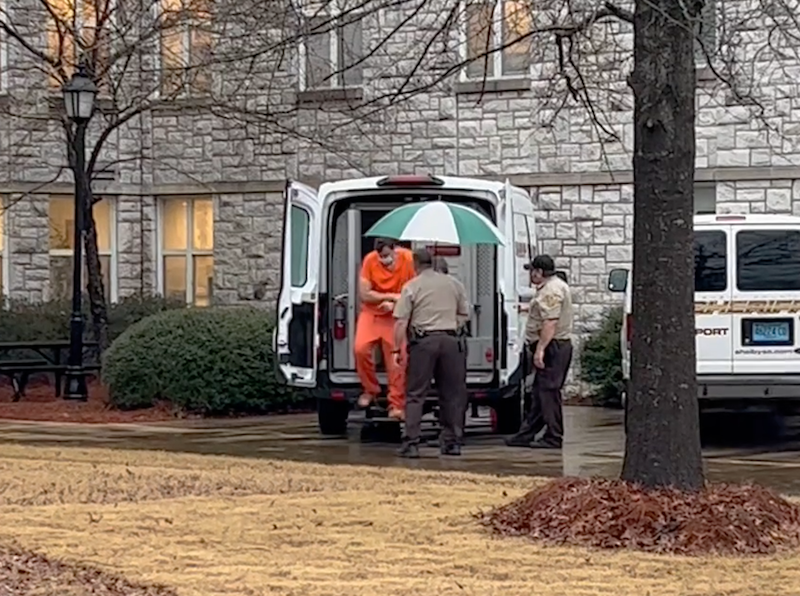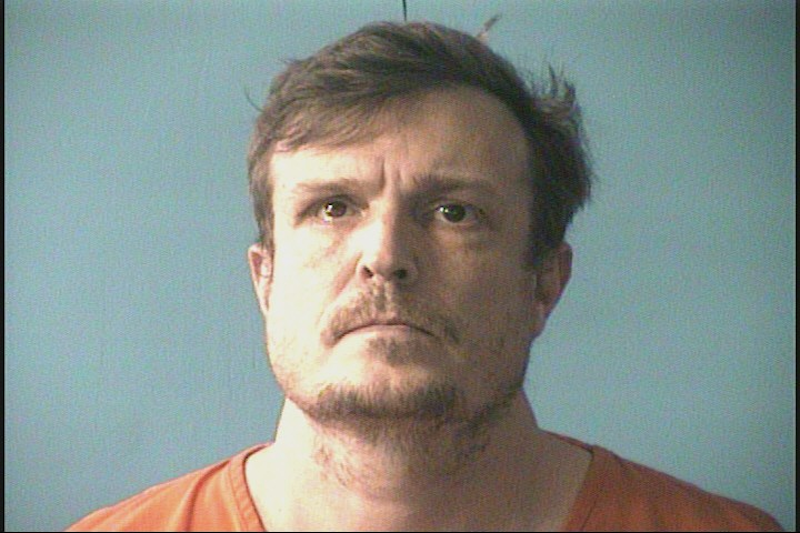Judge rules enough probable cause in Helena double-homicide case
Published 7:21 pm Thursday, April 21, 2022

- John Peyton Scott III arrives for his first court appearance. He faces capital murder chargers for the deaths of Sharon Tarwater Whited and Chester E Tarwater Jr. (Reporter photo/Alec Etheredge)
|
Getting your Trinity Audio player ready...
|
By MICHELLE LOVE | Staff Writer
HELENA – The case of the state of Alabama against John Peyton Scott III in a double homicide will go to trial, as determined by a preliminary hearing held on Thursday, April 21.
Judge Bill Bostick was the presiding judge over the hearing at the Shelby County Courthouse. The case is a capitol murder case against Scott for the murders of Sharon Whited and Chester Tarwater that occurred in Helena on Jan. 19.
Scott was present for the hearing with his counsel by his side.

Assistant District Attorney Ben Fuller examined the state’s primary witness, Shelby County Major Crimes Task Force Detective Brad Jordan. Throughout the hearing, Jordan presented details from the scene and provided evidence linking Scott to the scene.
On the afternoon of Wednesday, Jan. 19, members of the Helena Fire Department arrived at a residence located in the 100 block of Piney Woods Drive in Helena after receiving a 911 call from a 12-year-old resident of the home that his grandfather was injured.
Upon arriving to the scene, HFD determined the individual was deceased, and after further inspection of the home, another deceased individual was found in the master bedroom. The deceased were identified as Whited and Tarwater. Foul play was shortly determined upon investigation.
Once it became known Scott was a resident at the home, authorities began looking for him as a person of interest.
According to Jordan, Tarwater was found with what was later determined to be three gunshot wounds, one at the base of the skull, one at the crown and a third on the left side.
He said that Whited was found lying on the bed. She had 15 separate stab wounds, a gunshot wound to the forehead and severe trauma on her face.
A towel had been placed over her head. Stab wounds were located on her left hand, her neck, top of her head and the upper torso area of her back. Jordan said there was also a gunshot wound inside her mouth.
Jordan said due to drag marks from Tarwater’s body to the master bedroom, he did not believe Whited was killed in the master bedroom.
Jordan testified there were pools of blood throughout the house, multiple towels and evidence that someone had tried to clean the mess, and in the master bathroom sink, there was a small, 5-inch fixed blade knife covered with dried blood.
There were also drops of blood that were determined to be Scott’s that trickled throughout the house all the way out to the driveway.
The timeframe laid out by Jordan showed Tarwater returning home from the diner that he frequented for breakfast at approximately 8:40 a.m. driving his red Ford Ecosport car with a license plate of DV47860. At approximately 9:40 a.m., the same car was seen leaving the neighborhood by a neighbor’s Ring camera.
A layout of Scott’s activity after the murders took place showed at approximately 10:10 a.m., Scott spoke for several minutes with a man a few miles away from the crime scene.
After speaking with him, Scott was captured on camera at a Chevron gas station on Alabama 119 in Indian Springs around 10:30 a.m.
He was then seen in Escambia County approximately three-and-a-half hours after his sighting in Pelham.
Jordan said several attempts to contact Scott through his cell phone were made unsuccessfully. Authorities also attempted to track Scott through a Life 360 app, which had been disconnected.
Scott was later apprehended in St. John’s County outside of St. Augustine, Florida in the same red Ford Ecosport five days later.
According to Jordan, on Scott’s hand was a makeshift bandage made of paper towels and blue painter’s tape, something Jordan said was significant because the same combination of items was found in a wastebasket in the house.
Upon retrieving the vehicle, Jordan said authorities found blood splattered clothes, more paper towels and painter’s tape, a .45 pistol loaded with the same rounds found at the crime scene and a 556-Automatic Rifle.
Jordan said blood was found throughout the car, including on the carpet, and Scott had a deep laceration on his middle finger, which he had tried to bandage with the paper towels and painter’s tape.
When asked if he could describe the nature of Scott’s relationship with Whited, Jordan responded that it was tumultuous, and they understood that his status at the residence was a “static environment.”
“I know he moved out, then had moved back in, but I’m not sure of the chronological order,” Jordan said.
Defense attorney John Beck attempted to raise doubt as to whether Scott was present at the residence at the time the murders took place.
Beck asked Jordan whether he could identify Scott as the driver of the Ford Ecosport on the Ring camera footage, to which Jordan said no.
The defense asked Jordan to provide, as best he could, a working theory of the sequence of events that day.
“Miss Whited and Scott got into an argument that resulted in her being killed,” Jordan said. “Mr. Tarwater then returned home from the diner, then he was killed.”
The defense then brought Scott’s mental health status into the examination, asking Jordan if he had examined Scott’s history of mental health issues, to which Jordan said yes.
“Do you believe mental health played a role in the events that took place on January 19?” Beck asked.
“I can’t testify to that, I’m not qualified to testify to that,” Jordan responded.
Beck rephrased the question as to whether Jordan had found any evidence that speaks to mental health playing a role, to which Jordan said he did not.
Jordan described the motive as, “Domestic. I think there was an argument between the two of them. There were ongoing issues between them that evolved into this.”
Jordan confirmed there were several tests that results were still pending, including a blood-splatter test and digital forensics examination of all phones and laptops found at the residence.
When asked by the defense what the basis was for the arrest warrant for Scott, Jordan said it was his flight, his behavior and evidence found at the scene.
No other witnesses were called by state or defense.
“There is more than enough evidence to establish probable cause in this case,” Fuller told the court in his closing statement. “We’re talking about a capitol murder, so a murder involving the death of two or more people. We’ve got a pretty tight time frame to establish time of death. We have the nature of the injuries sustained, they are intimate, intimate injuries to the individuals. We’re talking multiple gunshot wounds, numerous stab wounds to Miss Whited, and we have more than ample evidence associating all of this with Mr. Scott.”
Beck said there was a lot more evidence that needed to be tested and reviewed before going forward.
“Mr. Scott apparently did have what can be characterized as defensive wounds on his own hands,” Beck said. “I think there is a great deal of speculation as to what did happen in this tragic situation, but that is why we go through this process.”
Bostick told the court he felt probable cause had been proved to go forward with a trial. The case will be handed over to the Shelby County Grand Jury for consideration. Scott will continue to be held without bail pending further order.









